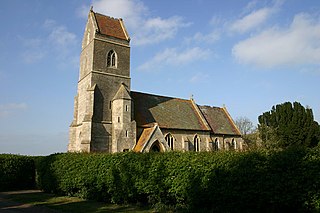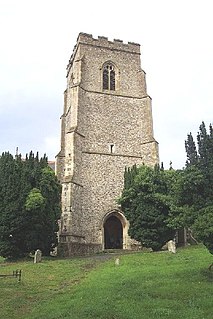Stratford is a family name and a place name, and may refer to:

Stratford-upon-Avon, commonly known as just Stratford, is a market town and civil parish in the Stratford-on-Avon District, in the county of Warwickshire, England, on the River Avon, 91 miles (146 km) north west of London, 22 miles (35 km) south east of Birmingham, and 8 miles (13 km) south west of Warwick. The estimated population in 2007 was 25,505, increasing to 27,445 at the 2011 Census.
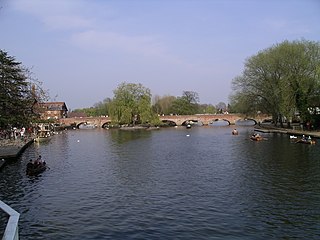
The River Avon or Avon is located in central England,
flowing generally southwestwards; it is a major left-bank tributary of the River Severn, of which it is the easternmost tributary system. It is also known as the Warwickshire Avon or Shakespeare's Avon, to distinguish it from several other rivers of the same name in the United Kingdom.

The River Stour is an English river that rises in the county of Oxfordshire but largely flows through Warwickshire. It is a tributary of the Avon, which it joins just south west of Stratford-upon-Avon.

Hugh Clopton was a Lord Mayor of London, a member of the Worshipful Company of Mercers and a benefactor of his home town of Stratford-upon-Avon in Warwickshire.
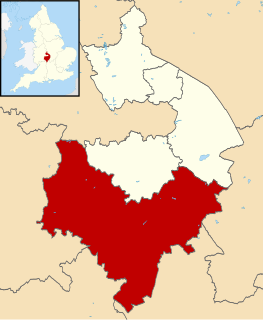
Stratford-on-Avon is a local government district of southern Warwickshire in England.
Stratford High School may refer to:

New Place was William Shakespeare's final place of residence in Stratford-upon-Avon. He died there in 1616. Though the house no longer exists, the site is owned by the Shakespeare Birthplace Trust, which maintains it as a specially-designed garden for tourists.

Clopton Bridge is located in Stratford-upon-Avon, England.
Stratford Girls' Grammar School is a fully selective girls' grammar school in England situated in Stratford-upon-Avon.

The A422 is an "A" road for east-west journeys in south central England, connecting the county towns of Bedford and Worcester by way of Milton Keynes, Buckingham, Banbury and Stratford-upon-Avon. For most of its length, it is a narrow single carriageway.
William Shakespeare (1564–1616) was an English playwright and poet.

Wilmcote railway station serves the village of Wilmcote, about 4 miles (6.4 km) north of Stratford-upon-Avon in Warwickshire, England. The station is run by West Midlands Trains. It is served by both West Midlands Trains and Chiltern Railways trains.
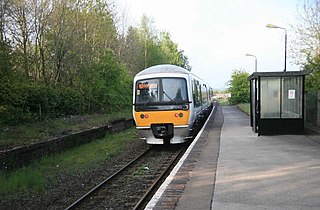
Bearley railway station serves the village of Bearley in South Warwickshire, England. It on the Leamington to Stratford Line. Today it is an unstaffed rural halt, managed by West Midlands Trains although Chiltern Railways provides most of the train services.

Whitlocks End railway station is a railway station on the North Warwickshire Line located next the hamlet of Whitlock's End in the West Midlands of England. It is located a short distance from the village of Hollywood in Worcestershire, and the new village of Dickens Heath. The station, and all trains serving it, are operated by West Midlands Trains.
William Wells Quatremain was an English artist who painted many oil and watercolour landscapes of Britain, many of which were also published as postcards.

Clopton House is a 17th-century country mansion near Stratford upon Avon, Warwickshire, now converted into residential apartments. It is a Grade II* listed building.
Burton Dassett Halt was a railway station on the former Stratford-upon-Avon and Midland Junction Railway in Warwickshire, England.

William Clopton (1538–1592) was a member of the English gentry who inherited New Place in Stratford upon Avon, and in 1563 sold it to William Bott.
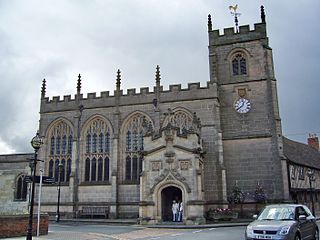
The Guild Chapel of the Holy Cross, Stratford-upon-Avon, Warwickshire is a chapel of 13th century origins. Founded by the Guild of the Holy Cross before 1269, it passed into the control of the town corporation in 1553, when the Guild was suppressed by Edward VI. The chapel stands on Church Street, opposite the site of William Shakespeare's home, New Place, and has historic connections to Shakespeare's family. The chapel was gifted an extensive series of wall-paintings by Hugh Clopton, an earlier owner of New Place, and John Shakespeare, Shakespeare's father, undertook their defacement in the later 1500s. The paintings have recently been conserved.

